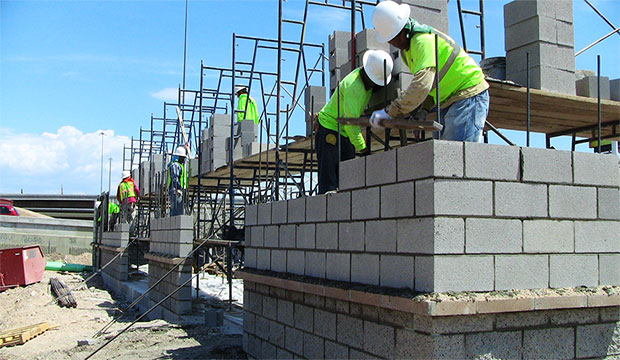- September 26, 2023
- Posted by: zijas
- Category: blogs

Introduction
The construction and masonry industry is the backbone of infrastructure development, shaping our cities, homes, and the structures we rely on daily. If you’re considering a career in this dynamic field, you’re on the path to building a solid foundation for your future. In this article, we’ll explore how to secure a job in the construction and masonry industry, highlighting the opportunities and steps you can take to succeed.
Opportunities in Construction and Masonry Workers
The construction and masonry industry encompasses a wide range of roles, from laborers and bricklayers to heavy equipment operators and project managers. Here are some of the exciting opportunities available:
Construction Workers: These professionals perform various tasks on construction sites, including digging trenches, operating machinery, and assisting in building structures.
Masonry Workers: Masons specialize in creating durable and visually appealing structures using bricks, concrete blocks, or stone. They construct walls, pathways, and other brick or stone structures.
Carpenters: Carpenters are skilled in working with wood, crafting everything from framing for buildings to intricate interior finishes.
Heavy Equipment Operators: Operating heavy machinery like bulldozers, cranes, and excavators is crucial for various construction projects.
Construction Managers: These professionals oversee and manage construction projects, ensuring they stay on budget and on schedule.
How to Secure a Job in Construction and Masonry
Education and Training:
Consider formal instruction or apprenticeship programs. Numerous development and workmanship laborers start their vocations as students, advancing at work from experienced experts. These projects frequently give a mix of study hall guidance and involved preparing.
Certifications:
Depending on your role, certifications may be necessary. For example, masons can become certified through organizations like the Mason Contractors Association of America (MCAA). Certification can enhance your job prospects and earning potential.
Build a Strong Resume:
Craft a well-structured resume that highlights your relevant skills and experience. Emphasize any construction-related coursework, apprenticeships, or certifications you’ve completed.
Networking:
Connect with professionals in the construction and masonry industry through networking events, online platforms, and local trade organizations. Networking can lead to job referrals and opportunities.
Online Job Search:
Use online job portals and company websites to search for job openings in your area. Tailor your resume and cover letter to each application to demonstrate your interest and qualifications.
Frequently Asked Questions (FAQs) – Construction and Masonry Workers
1. What skills are essential for a career in construction and masonry?
Essential skills include physical strength, attention to detail, teamwork, problem-solving, and the ability to follow safety protocols. Masons, in particular, need precision and artistic skills for crafting brick and stone structures.
2. Is formal education necessary for a career in construction and masonry?
While formal education is not always required, it can be beneficial. Many workers start as apprentices, gaining practical experience on the job. However, construction management roles often require a bachelor’s degree.
3. Are there age restrictions for entering the construction and masonry industry?
There are typically no age restrictions for entering the industry. Workers of various ages can pursue careers in construction and masonry, and apprenticeship programs often welcome individuals of all ages.
4. How can I advance my career in construction and masonry?
To advance, consider gaining additional certifications, pursuing further education, or specializing in a particular aspect of the industry. Networking with professionals and gaining experience on larger projects can also lead to advancement.
5. What safety precautions should I take in construction and masonry work?
Safety is paramount in these fields. Always use personal protective equipment (PPE), follow safety guidelines, and stay updated on industry best practices to minimize the risk of accidents and injuries.
6. Are there any physical fitness requirements for a career in construction and masonry?
Physical fitness can be an asset in these fields, as the work often involves lifting heavy materials, standing for extended periods, and performing physically demanding tasks. However, specific fitness requirements may vary depending on the job role and employer.
7. What is the job outlook for construction and masonry workers?
The job outlook for construction and masonry workers is generally positive, with steady demand for skilled labor in the industry. Infrastructure development, maintenance, and renovation projects contribute to ongoing opportunities in this field.
8. Do construction and masonry workers need to keep up with technological advancements?
Yes, staying updated with technological advancements in construction equipment and techniques can be beneficial for your career. Embracing new technologies, such as computer-aided design (CAD) software or building information modeling (BIM), can enhance your skill set and job prospects.
9. Can women pursue careers in construction and masonry?
Absolutely, the construction and masonry industry is becoming more inclusive, and women are increasingly pursuing careers in these fields. Many organizations actively promote diversity and equal opportunities for all genders.
10. What is the average salary range for construction and masonry workers?
Salary ranges vary depending on factors like location, experience, and job role. On average, construction and masonry workers can earn competitive wages. Skilled and experienced workers often command higher salaries, especially in specialized roles or leadership positions within the industry.

